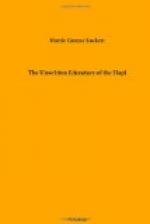“After a few weeks they let them go away. Some Hopi men were bribed to get some girls to go down off the mesa that day so these Spaniards could take them away with them.
“They asked me to go and a girl friend of mine, but we would not go. One girl did go, for a famine was beginning and this poor girl thought she was being taken to visit with the Zunis and would be better off there. Nobody ever got track of her again.
“Once food was so scarce that I had to go with my mother and sister to Second Mesa, and we stayed there with our clan relations till food was scarce, and then we went to Oraibi and stayed with our clan relations there until summer. We could go back to Walpi then because corn and melons were growing again; but we left my sister because she had married there.
“This was a two-year famine and almost everybody left Walpi and wandered from village to village, living wherever they could get food. There had been more rain and better crops in some of the other places.
“Ever since then some Walpi people have scattered among other villages, where they married, and some went as far as the Rio Grande villages, and some perished on the way.
“Again after many years, Spaniards came, stealing corn, and this time they went through the houses and stole whatever they wanted. They took away ceremonial and sacred things, that was the worst. And when they left, they went northeast, past where Tom’s store is now.
“No, there were never any Spanish missionaries living in Walpi; those who tell of priests living here are mistaken—too young to know. I have heard of those at Oraibi long ago, and at Awatobi; some were killed at those places.
“Some of the rafters of this house, not of this room but another part, were brought from ruins of Awatobi. An uncle of my daughter’s husband here brought some sacred things from Awatobi and revived some of the old ceremonials that had been dropped on account of our not having the right things to use for them. Spaniards had already been here and taken some of those things out of the houses, so some ceremonies could never be held any more without those things. You see, the Awatobi people had some such things, too, and so our people wanted to save them. I think some of our trouble with Awatobi was to get these things.
“I remember that after the famine, when crops were good again, we had trouble with Navajos. It was in the summer and a Hopi hoeing his field was killed by a bunch of thieving Navajos, and that started the trouble. This man who was killed had a crippled nephew working with him at the time, and that boy got away and ran back to Walpi with the word, and everybody was surprised that he could run fast enough to get away.
“After that they made him a watchman to look out for Navajos.
“A good while after that two Hopi boys were fired upon by prowling Navajos who were hiding in the village of Sichomovi. For a number of years then the Navajos plundered the fields, drove off the stock, and killed children. Then they stopped coming here for a good while, but later they began doing all those things again, worse than ever. So then the Hopi decided to shoot every Navajo they saw in their fields, and this stopped the trouble.




